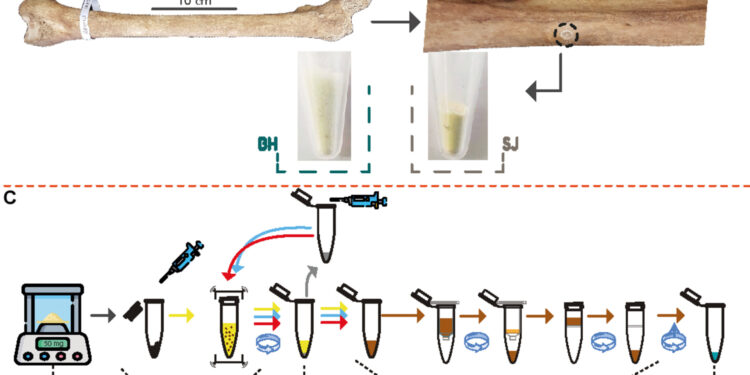Experimental design followed for untargeted metabolomic analysis. Credit: Scientific advances (2024). DOI: 10.1126/sciadv.adn9317
A team of archaeologists and historians from the University of Leicester used metabolites found in the bones of people who lived hundreds of years ago to determine whether they had smoked. In their study published in the journal Scientific advances, the group used a new technique to identify smokers living in 18th century England.
Previous research has shown that some smokers from ancient times can be easily identified by the marks left on their teeth by clay pipes. Black-stained teeth can also be a strong sign. But as the researchers of this new effort note, not all smokers retained their teeth, which is why historians would like another way to evaluate the remains to determine whether individuals smoked while alive.
In this new effort, the research team looked at metabolites found in bone as a possible resource. Metabolites, as their name suggests, are intermediate or end products of metabolism. Previous research has shown that when tobacco is chewed or smoked, some of the resulting metabolites are found in the bones. In this new effort, the researchers wondered whether it would be possible to find such metabolites in the bones of people who lived and died in 18th-century England.
The team first had to determine what these metabolites might look like. To this end, they compared the chemical composition of bones of known smokers from the 1700s with the chemical composition of bones of people who lived before tobacco was introduced to England in the 1500s. They found dozens of compounds that appeared be likely candidates.
They then searched for the compounds in 323 skeletons removed from cemeteries in two English localities; North Lincolnshire and London. They found that smoking was much more widespread in the region than today: about half of all people studied were smokers and came from all levels of society, both men and women. The team’s findings are surprising because until now, smoking was thought to be primarily a male habit.
The research team suggests this is one of the first studies to use metabolic techniques with skeletal samples to learn more about chemicals consumed by humans hundreds of years ago.
More information:
Diego Badillo-Sanchez et al, Archaeometabolomics characterizes phenotypic differences in human cortical bone at a molecular level linked to tobacco consumption, Scientific advances (2024). DOI: 10.1126/sciadv.adn9317
© 2024 Science X Network
Quote: Archaeologists use metabolites in bones to identify smokers from centuries ago (October 7, 2024) retrieved October 7, 2024 from
This document is subject to copyright. Except for fair use for private study or research purposes, no part may be reproduced without written permission. The content is provided for informational purposes only.



